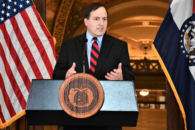While Missouri lawmakers did not progress any of this year’s proposed initiative petition reforms to the governor’s desk, legislators are expected to take up the issue once again next session.
With possible changes on the horizon amid a larger conversation about elections, here’s a look at Missouri’s initiative petition process and the proposed reforms.
How does the process work?
Initiative petitions must follow the single-subject rule and cannot change or enact more than one article to the state constitution. Petitions must not be used for unconstitutional purposes and are required to indicate a funding source.
Petitioners must submit proposals to the Secretary of State’s Office along with information on its funding. The proposal is then sent to the Attorney General’s Office for review while the Auditor’s Office prepares a fiscal note.
The Secretary of State’s Office has 15 days to accept or reject the proposal, with a summary statement due from the office within 23 days of its approval. The official ballot title is then approved and posted to the secretary of state’s website.
Petition circulators, who must be registered with the state, collect signatures from registered voters with separate pages dedicated to signatures from only one county. Signatures must be delivered to the Secretary of State’s Office six months ahead of the election.
Petition pages are then distributed to local election authorities to verify the signatures. Statutory changes require 5 percent of any six congressional districts to sign onto the petition, while constitutional changes require 8 percent of voters in six districts.
A petition becomes a ballot measure once it is accepted for the ballot. Referendums passed by the legislature or approved by two-thirds of voters in each congressional district are also considered ballot measures once they reach that stage.
The General Assembly must pass a referendum the same way it would a bill to get it to the ballot. Unlike legislation, the governor does not have the authority to veto a referendum passed by the legislature.
Legislative proposals must be submitted to the Secretary of State’s Office within 90 days of the end of the session in which they were passed.
What changes have been proposed?
Several elections-related bills were sponsored during the 101st General Assembly in 2021, including a handful of proposed changes to the initiative petition process. One bill would have charged a $500 filing fee for initiative petitions, refundable if the petition is approved for circulation. Another measure sought to prohibit courts from modifying summary language approved by the General Assembly.
A proposed resolution would have required an amendment to the state constitution to receive a two-thirds majority vote for it to be approved and signatures from 10 percent of each congressional district to make it to the ballot.
The proposals saw pushback from several groups, including former lawmakers and the ACLU of Missouri.
“These bills would limit the power of the people to put initiatives on the ballot,” Mo Del Villar, legislative associate for the ACLU of Missouri, said. “Missourians have exercised this right for over 100 years, and through the process, we have moved the state forward through the expansion of Medicaid, Clean Missouri, the legalization of medical marijuana. We need all the tools available to push back.”
Several Republican lawmakers urged Gov. Mike Parson to call an extraordinary session to enact the proposals before the legislative session came to a close, but the chief executive has not done so.
Despite stagnating this year, lawmakers convened committees during the interim to discuss the proposals. Ashcroft, a Republican, has spoken in favor of election reforms numerous times.
“Our office believes that the constitution of the state should not be changed unless the people of Missouri broadly agree with that change,” Ashcroft previously said.

Cameron Gerber studied journalism at Lincoln University. Prior to Lincoln, he earned an associate’s degree from State Fair Community College. Cameron is a native of Eldon, Missouri.
Contact Cameron at cameron@themissouritimes.com.































